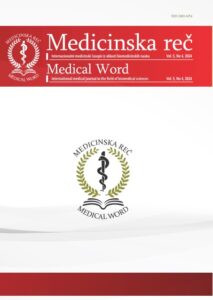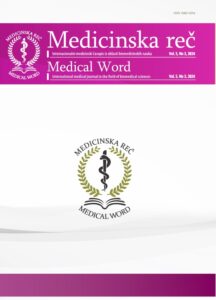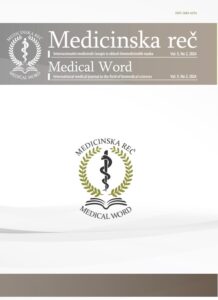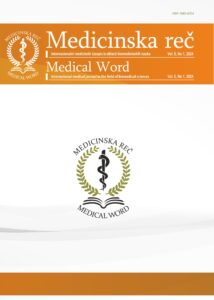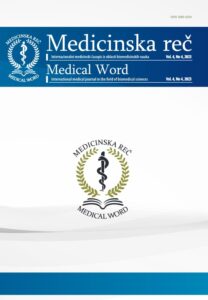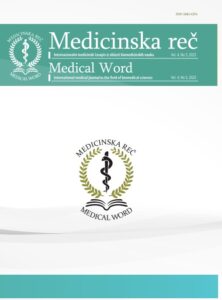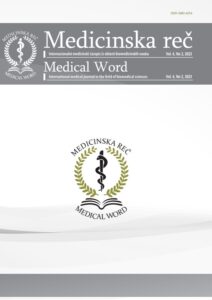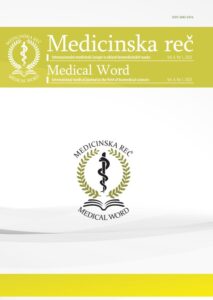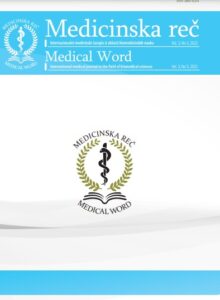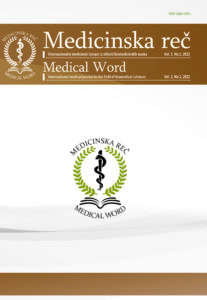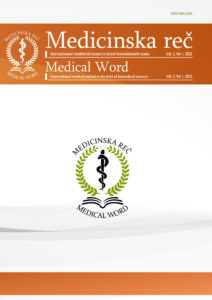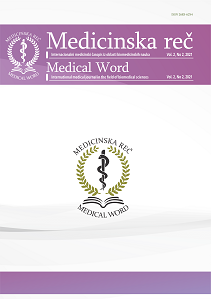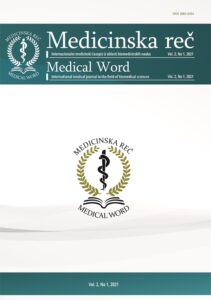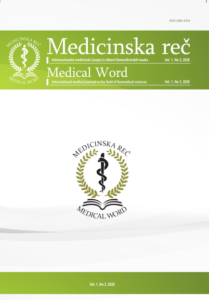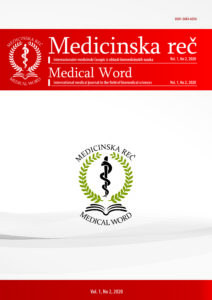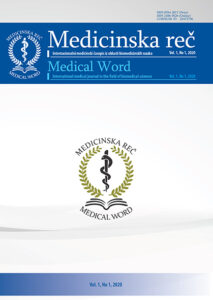Monitoring of patients on oral anticoagulant therapy in COVID-19 pandemic conditions
Medical Word 2022; 3(1): 10–13
https://doi.org/10.5937/medrec2201010A
Original article
Ana Antić
Abstract
Although the outpatient clinic for monitoring anticoagulant therapy (ACT) was not in the first line of priority in conditions of the COVID-19 pandemic, the response of the entire health system included the reorganization of this service, all in order to ensure the highest quality of monitoring patients in pandemics. AKA continued to work in the conditions of lockdown and the “stay at home” campaign, providing the highest quality of professional support to patients, while providing all measures to protect against the virus transmission (unaccompanied arrival, measuring body temperature at the entrance, wearing a protective mask, alcohol hand disinfection, physical distance). Patients taking vitamin K antagonists (VKA) are recommended to use their own portable INR control devices at home.
Patients taking direct oral anticoagulants (DOACs) or VKAs should continue their previously prescribed therapy, unless their transfusiologist prescribes otherwise, taking into account the therapy they are taking to treat COVID-19 infection. In patients with a previously well-regulated INR (TTR > 60%) and in good general condition, the interval until the next INR control is extended to 12 weeks, and for all patients in whom the use of DOAK is possible, switching from AVK to DOAK is recommended.
Management of anticoagulant therapy should be based on the principles of work in the conditions before the COVID-19 pandemic in combination with rational principles that are introduced in the current conditions.
Key words: COVID-19, anticoagulant therapy, INR, warfarin, direct anticoagulants
Literatura
- Kovač M. Antitrombozna terapija. U: Kovač M, Balint B, Bogdanović G. Bazična i klinička transfuziologija. Beograd: Medicinski fakultet, Akademska misao; 2020: 373-82.
- Hirsh J. Oral antioagulant drugs. N Engl J Med 1991; 324: 1865-75.
- Stanojković Z, Antić A, Balint B, Todorović M, Vučić M, Vacić N, Lazarević M. Evaluation of the anticoagulant effect of vitamin K antagonists in patients with non-valvular atrial fibrillation. Vojnosanit Pregl 2020; 77(12): 1260-5.
- Franchini M, Liumbruno GM, Bonfanti C, Lippi G. The evolution of anticoagulant therapy. Blood Transfus 2016; 14(2): 175-84.
- Prisco D, Ageno W, Becattini C, D’Angelo A, Davì G, De Cristofaro R, et al. SIMI (Italian Society of Internal Medicine) FADOI (Federation of Associations of Hospital Doctors on Internal Medicine) SISET (Italian Society for the Study of Haemostasis and Thrombosis) Italian intersociety consensus on DOAC use in internal medicine. Intern Emerg Med 2017; 12(3): 387–406.
- Poli D, Tosetto A, Palareti G, Barcellona D, Ciampa A, Grandone E, et al. Managing anticoagulation in the COVID-19 era between lockdown and reopening phases. Intern Emerg Med 2020; 15(5): 783-6.
- European Centre for Disease Prevention and Control. Infection prevention and control for COVID-19 in healthcare settings—sixth update. 9 February 2021. ECDC: Stockholm; 2021.
- Cayley W. Self-Monitoring and Self-Management of Oral Anticoagulation. Am Fam Physician 2017; 95(11): 700-1.
- Sharma P, Scotland G, Cruickshank M, Tassie E, Fraser C, Burton C, et al. Is self-monitoring an effective option for people receiving long-term vitamin K antagonist therapy? A systematic review and economic evaluation BMJ Open 2015; 5:e007758.
- Bikdeli B, Madhavan MV, Jimenez D, Chuich T, Dreyfus I, Driggin E, et al; Global COVID-19 Thrombosis Collaborative Group, Endorsed by the ISTH, NATF, ESVM, and the IUA, Supported by the ESC Working Group on Pulmonary Circulation and Right Ventricular Function. COVID-19 and Thrombotic or Thromboembolic Disease: Implications for Prevention, Antithrombotic Therapy, and Follow-Up: JACC State-of-the-Art Review. J Am Coll Cardiol 2020;75(23):2950-73.
- Testa S, Prandoni P, Paoletti O, Morandini R, Tala M, Dellanoce C, et al. Direct oralanticoagulant plasma levels striking increase in severe COVID-19 respiratory syndrome patients treated with antiviral agents. The Cremona experience. J ThrombHaemost 2020; 18(6): 1320-3.
- Testa S, Paoletti O, Giorgi-Pierfranceschi M, Pan A. Switch from oral anticoagulants to parenteral heparin in SARS-CoV-2 hospitalized patients. Intern Emerg Med 2020; 15(5): 751-3.
- Management of patients on oral anticoagulants during COVID-19. Australian Comission on Safety and Quality in Health Care, 27 August 2020. Available from: https://www.safetyandquality.gov.au/sites/default/files/2020-05/Covid-19%20Position%20statement%20-20Management%20of%20patients%20on%20oral%20anticoagulants%20during%20COVID-19%20-%2012%20May%202020.PDF (Accessed on: March 23 2022).
- Clinical guide for the management of anticoagulant services during the corona virus pandemic. NHS England and NHS improvement, November 2020, Updated February 2021. Available from: https://www.nice.org.uk/media/default/about/covid-19/specialty-guides/specialty-guide-anticoagulant-services-and-coronavirus.pdf (Accessed on: March 29 2022).
- OpenSAFELY Collaborative, Curtis HJ, MacKenna B, Walker AJ, Croker R, Mehrkar A, Morton C, Bacon S, Hickman G, Inglesby P, Bates C, Evans D, Ward T, Cockburn J, Davy S, Bhaskaran K, Schultze A, Rentsch CT, Williamson E, Hulme W, Tomlinson L, Mathur R, Drysdale H, Eggo RM, Wong AY, Forbes H, Parry J, Hester F, Harper S, Douglas I, Smeeth L, Goldacre B. OpenSAFELY: impact of national guidance on switching anticoagulant therapy during COVID-19 pandemic. Open Heart 2021; 8(2):e001784.
- Steffel J, Verhamme P, Potpara TS, Albaladejo P, Antz M, Desteghe L, et al; ESC Scientific Document Group. The 2018 European Heart Rhythm Association Practical Guide on the use of non-vitamin K antagonist oral anticoagulants in patients with atrial fibrillation. Eur Heart J 2018;39(16):1330-93.
- Anticoagulants, including direct-acting oral anticoagulants. National Institute for Health and Care Excellence, 26 February 2016, Updated 01 September 2019. Available from: https://www.nice.org.uk/advice/ktt16 (Accessed on: March 15 2022).


